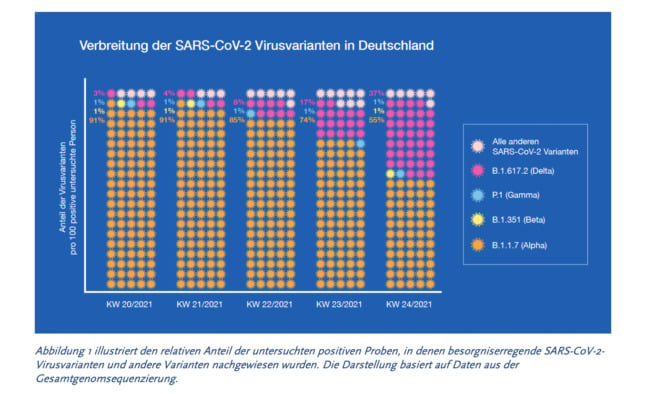The strain of Covid, first discovered in India, is now thought to account "for at least half of all new infections" in Germany, the Robert Koch Institute (RKI) said in its latest report on Wednesday evening.
The proportion of the Delta variant (B.1.617.2) in a sample of new cases from June 14th to 20th was around 37 percent, researchers found. That is more than twice as much as the week before, when it was around 17 percent. But the real figure is thought to be even higher due to the time lag involved in whole-genome sequencing analysis.
 The RKI graphic shows the share of variants from analysing some positive cases in Germany. The Delta variant is shown in bright pink. Source: Robert Koch Institute.
The RKI graphic shows the share of variants from analysing some positive cases in Germany. The Delta variant is shown in bright pink. Source: Robert Koch Institute. Overall, the trend in the significant increase in the Delta share among cases since the end of May is continuing. RKI boss Lothar Wieler said on Monday he thought Delta accounted for half of new infections in Germany during a conference with federal and state health ministers.
However, the Covid incidence rate in Germany remains low. On Thursday, 892 Covid cases were reported within 24 hours, as well as 63 deaths. The 7-day incidence stood at 5.1 cases per 100,000 people.
READ ALSO: Share of Delta variant cases in Germany almost doubles in a week
When it comes to Delta Covid cases logged, the RKI said the variant was "increasingly spreading" in Germany, although case numbers overall remain fairly low. In the past four weeks it has been detected in all 16 states.
About 410 Delta Covid infections were recorded in the week from May 31st to June 6th, while the RKI received 724 reports from June 14th to 20th. However, not every positive sample is examined for variants.
As we said above, the 7-day incidence in Germany is falling. However, experts do fear a trend reversal with increasing Delta cases to match what has happened in the UK in recent weeks (shown in the Our World in Data chart below)
Germany has seen a massive decline in in the recently predominant variant Alpha, first detected in the UK. For Alpha cases, the RKI reports a decrease in the estimated 7-day incidence from 76 to around five over a period of six weeks. The incidence of Delta increased in the last three weeks rose from 2.0 to 3.2.
What are experts saying?
The Delta variant is likely already dominant in certain areas, perhaps even across Germany, said the Frankfurt virologist Sandra Ciesek on Tuesday in the podcast Coronavirus Update.
The fact that the share of Delta has increased relatively sharply is also due to the currently very low number of cases. Outbreaks - which according to the RKI affect households, workplaces and schools - have also played a role. If it spreads further, the nationwide 7-day incidence could rise again, the expert expects.
For Ciesek, it is now a matter of rapid containment. "Delta is even less forgiving than the other variants if you don't act quickly enough," she said.
Outbreaks have to be brought under control, for example through quick follow-up tests and quarantine, she urged.
READ ALSO: Germany to accelerate vaccinations as Delta variant spreads
The RKI report shows that almost every 10th case of the Delta strain infections reported so far in June can be traced back to a possible infection abroad. However, most cases are detected through outbreaks in private homes, workplaces and schools in Germany.
The most frequently mentioned countries where Delta was contracted were Afghanistan (44 cases), Russia (26) and Italy (22). However, Ciesek emphasise that people could also get infected when traveling within Germany.
Germany has come down hard on countries that are seeing a surge in Delta variant infections. This week Portugal and Russia were added to the 'virus variant areas of concern' list, meaning travel from these places is severely restricted.
The UK, India, Nepal, South Africa and Brazil are also on the list. .
To protect against severe illness from the Delta strain, full vaccinations - i.e. receiving the first and second dose - is important, research from the UK shows.
So far, a little more than a third - 36.5 percent - of the German population has been fully vaccinated. About 54.5 percent of people have been given at least one jab. German experts have been looking at whether to shorten the gap between the two doses in order to mitigate the risks of a Delta outbreak.
According to Ciesek, there is still a lack of data on how the Delta variant reacts with the Johnson & Johnson vaccine, which only requires one dose. In the US, experts are discussing whether people who have been vaccinated with J&J should receive a booster shot with another vaccine.

Comments